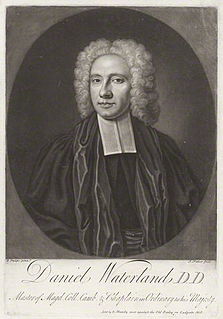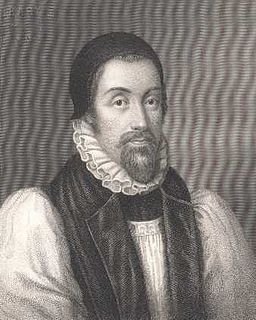Life
He was born in Bedfordshire and entered King's Hall, Cambridge, as a Bible clerk. He received the degrees of B.A. early in 1535, M.A. in 1541, and B.D. in 1547. [2]

Bedfordshire is a county in the East of England. It is a ceremonial county and a historic county, covered by three unitary authorities: Bedford, Central Bedfordshire, and Luton.

King's Hall was once one of the constituent colleges of Cambridge, founded in 1317, the second after Peterhouse. King's Hall was established by King Edward II to provide chancery clerks for his administration, and was very rich compared to Michaelhouse, which occupied the southern area of what is now Trinity Great Court.
He held the living of Grendon, Northamptonshire, which was in the gift of King's Hall, from 21 September 1538, to November, 1541, and successively, fellowships of King's Hall, St. Catharine's Hall, and of Trinity College, Cambridge. Early in Queen Mary's reign he was elected Master of St. Catharine's College, Cambridge, which brought him as gifts from the Crown the Norfolk rectories of St. Edmund, North Lynn (1533), Fakenham (1555), and the Norfolk vicarages of Caistor Holy Trinity, and of Oxburgh (1554). He was presented to the rectory of Thorpland by Trinity College in the following year.

Grendon is a small village and civil parish in rural Northamptonshire, England on the borders of Bedfordshire and Buckinghamshire. Many houses are made of the local limestone and various older thatched houses still survive. The name of the village means "green hill" and today the village remains centred on the hill. As with Earls Barton, the village was owned by Judith, the niece of William the Conqueror.

Northamptonshire, archaically known as the County of Northampton, is a county in the East Midlands of England. In 2015 it had a population of 723,000. The county is administered by Northamptonshire County Council and by seven non-metropolitan district councils. It is known as "The Rose of the Shires".

Trinity College is a constituent college of the University of Cambridge in England. With around 600 undergraduates, 300 graduates, and over 180 fellows, it is the largest college in either of the Oxbridge universities by number of undergraduates. In terms of total student numbers, it is second only to Homerton College, Cambridge.
He was also chaplain to Bishop Bonner [3] of London and assistant to Michael Dunning, the Chancellor of the Diocese of Norwich. In 1558 he was elected Vice-Chancellor of Cambridge.
Michael Dunning (d.1558) was Chancellor of the Diocese of Norwich from 1554 under Mary Tudor, and with John Hopton, Bishop of Norwich, was responsible for the burning of 31 heretics. John Foxe characterised Dunning as the "bloody chancellor."
Being a Catholic, he refused to conform when Elizabeth I of England came to the throne, and hence in 1560 was forced to resign all his preferments. He went in 1564 to live in retirement in Caius College, Cambridge. Four years later, summoned to answer before the Lords of the Council to a charge of non-conformity, he went into exile rather than forswear his faith. He was living on the Continent in 1576 but no further definite records of his career are available.

Elizabeth I was Queen of England and Ireland from 17 November 1558 until her death on 24 March 1603. Sometimes called the Virgin Queen, Gloriana or Good Queen Bess, Elizabeth was the last of the five monarchs of the House of Tudor.








